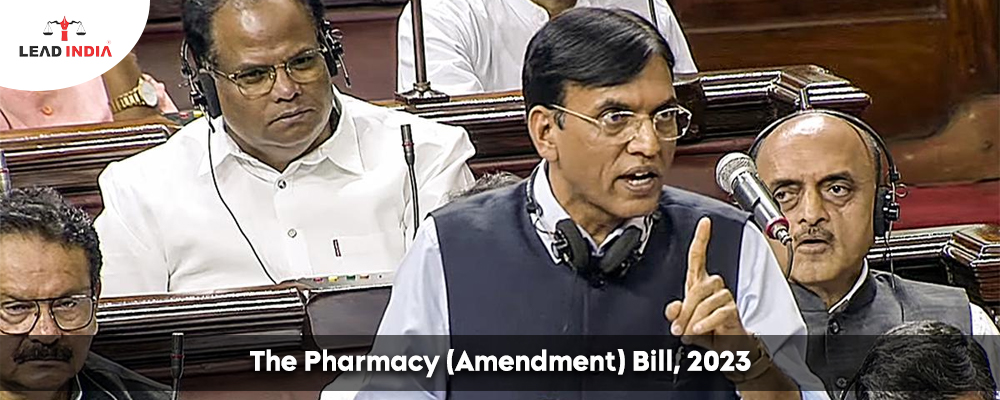The Union Health Ministry requested feedback from the general public and stakeholders on the proposed National Pharmacy Commission Bill 2023. Previously, during the August session of Parliament, the National Nursing and Midwifery Commission Bill 2023 and the National Dental Commission Bill 2023 were approved.
It intends to replace the Pharmacy Act of 1948 and the current Pharmacy Council of India (PCI) with the National Pharmacy Commission.The pharmacy profession is governed under the 1948 Act, albeit stricter rules for regulating the profession and practice of pharmacy are needed. The Pharmacy Council of India was established for this purpose. The Bill aspires to expand access to inexpensive, high-quality pharmacy education, assure the availability of pharmacy professionals throughout the country, and promote equitable healthcare by making pharmacy services available to all residents.
Need A Legal Advice
The internet is not a lawyer and neither are you. Talk to a real lawyer about your legal issue

Key provisions of the Pharmacy (Amendment) Bill, 2023
- The National Pharmacy amendment bill proposes establishing a commission headquartered in New Delhi.
- The Commission will be made up of a Chairperson, 13 ex-officio members, and 14 part-time members.
- There are three boards: The Central Government will establish three boards, namely the Pharmacy Education Board, the Pharmacy Assessment and Rating Board, and the Pharmacy Ethics and Registration Board, to operate under the Commission.
- The bill prevents the establishment of new pharmacy institutions or courses without prior approval from the Pharmacy Assessment and Rating Board. This Board will analyze and rate pharmacy establishments, as well as make assessment records available on its website. Noncompliance with minimal criteria may result in disciplinary sanctions such as warnings, penalties, limited intake, admission suspension, or recognition revocation.
- National Pharmacy Register: According to the proposal, the Pharmacy Ethics and Registration Board will keep a National Pharmacy Register with information about pharmacy professionals to promote openness.
- Implementation: State governments must establish a state pharmacy chapter within one year of the Act’s enactment if one does not already exist under state law. This will aid in the exercise of powers and discharge of obligations as outlined in the Act.
- Periodic and transparent assessment: The Bill also asks for a regular and transparent evaluation of pharmacy institutions.
- The Bill encourages professionals to use current knowledge, contribute to research, and maintain high ethical standards. It creates an effective grievance redressal process for pertinent issues. The proposed bill suggests adaptability to changing needs and tries to establish an effective grievance redressal procedure.
- To practice pharmacy in India, you must first register under the Pharmacy Act of 1948. According to the Bill, anyone who is registered as a chemist under the Jammu and Kashmir Pharmacy Act, 2011, or who meets the qualifications provided by the 2011 Act, is presumed to be registered as a chemist under the Pharmacy Act, 1948. This is subject to the individual submitting an application for registration within a year of the amendment going into effect and paying a prescribed fee.
The National Pharmacy Commission performs the following functions
- The commission is responsible for developing educational standards, facilities, assessments, training, research, and tuition costs.
- It would define criteria for pharmacy faculty and clinical facilities, administer a standardized admissions process, and oversee pharmacy education and training regulations.
- Furthermore, the commission would monitor and regulate pharmacy institutions, research activities, experts, and associates.
- The commission will also establish regulations to ensure the competency of pharmacy practitioners.
- The commission will evaluate pharmacy professionals through final year undergraduate exams to confirm their competence for enrolment in the National or State Registers and give licenses to practice.
- It will also be responsible for collaborating with industry and other universities to leverage cutting-edge technologies and hybrid education to boost pharmaceutical innovation and research.
- To ensure professionals’ global mobility, the council must teach them soft skills and offer elective courses at educational institutions.
Lead India provides free legal advice, internet information, and other legal services. We offer a forum where you may talk with a lawyer and ask legal questions. Lead India’s Lawyers may assist you with any legal matters. Lead India’s solicitors can help you with any legal concerns. Lead India also offers free online legal help in India. In addition to providing online legal aid, Lead India allows users to ask specialist inquiries for free.





 Talk to a Lawyer
Talk to a Lawyer